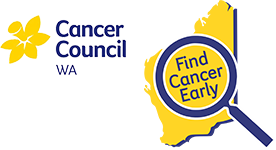Cancer Council spreads regional awareness message
Whatever the outcome, it’s best to find out what’s going on early and get onto any recommended treatment. If it turns out to be nothing you’ve got peace of mind and you can save yourself the uncertainty of the ‘wait and see’ approach.
This article was published in the Bunbury Mail on 3 January 2020.
The state’s peak cancer organisation is running its Find Cancer Early program, encouraging those in regional WA over the age of 40 to make their health a priority in the new year.
As part of the program, launched to improve cancer outcomes for regional Western Australians, Cancer Council WA is urging people to familiarise themselves with cancer symptoms.
“Research indicates regional West Aussies tend to present at the GP at a later stage for a number of reasons including because they can be more optimistic, laid back and sometimes make excuses for not seeking help, which may contribute to later stage cancer diagnoses,” she said.
“The Find Cancer Early program aims to increase awareness of the symptoms of the five most common cancers – prostate, breast, skin, bowel and lung cancer – which make up around 60 per cent of cancer diagnoses in WA.
“With bowel and breast screening programs occurring at two year intervals, this leaves 1 in 9 regional Western Australians at risk of a later stage cancer diagnosis due to confusion around when and how to respond to the symptoms of common cancers.
“Whatever the outcome, it’s best to find out what’s going on early and get onto any recommended treatment. If it turns out to be nothing you’ve got peace of mind and you can save yourself the uncertainty of the ‘wait and see’ approach.
“It’s important to remember screening tests like bowel cancer screening kits and mammograms are designed for people who aren’t experiencing symptoms.
“If you don’t have any symptoms and you’re eligible, please participate in screening.
“Remember, the earlier cancer is found, the greater the chance of successful treatment.”
If you experience any of the below symptoms, Cancer Council WA recommends the following:
- If you find blood in your poo, blood in your pee or you’ve coughed up blood, even just on one occasion, it needs to be discussed with a doctor, clinic nurse or Aboriginal health worker straight away.
- If for more than three weeks you have noticed any changes to your bowel habits, including runny poo, pooing more often or constipation, make an appointment at your local medical clinic.
- Similarly, if for more than four weeks you’ve noticed problems peeing, unexplained weight loss, an unusual pain, lump or swelling anywhere in your body, or you are short of breath or have a persistent cough, see a doctor, clinic nurse or Aboriginal health worker.
To find out more about the Find Cancer Early campaign, email Ms Norris at snorris@cancerwa.asn.au
